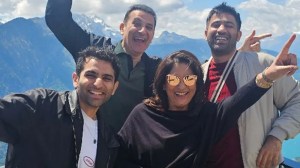One down, many to win
After Zarqawi, Washington and Baghdad must reach out to the Sunni leaders

At a time the war in Iraq seemed no longer winnable, the death of al Zarqawi, the mastermind of the brutal Iraqi insurgency who carried a bounty of 25 million on his head, is a shot in the arm for President George W. Bush, who, it must be said, stood firm in his commitment to a successful democratic transition in Iraq. It also gives a big boost to the first constitutional government in Iraq led by Nur ul Maliki, who took charge only a few weeks ago. The immediate fall in spot prices of crude on international markets below 70 represents the worldwide stake in a less violent Iraq.
That the fall in oil prices was not too sharp, however, suggests the celebrations in Washington and Baghdad might be premature. Just as Saddam Hussein8217;s capture at the end of 2003 did not put an end to the Iraqi insurgency, it is by no means clear that the killing of al Zarqawi would break the back of the opposition in Iraq. No one is denying the centrality of al Zarqawi in organising the terror attacks, kidnappings and beheadings in Iraq in the last couple of years. After combining his own organisation with that of the Al-Qaeda in Iraq during 2004, al Zarqawi emerged as the brains behind the devastating threat to the Iraqi government and American occupation forces. But the US itself has been saying that the Al-Qaeda is not a centrally controlled organisation. Its loose structuring through independently operating cells of terrorists, it is said, has allowed it to survive the big reverses in Afghanistan and threaten the rest of the world.
Contrary to the conventional wisdom in India, the insurgency led by al Zarqawi was not mobilising Iraqi nationalism against American occupation. His agenda was entirely Sunni and sectarian. As he sought to establish an Islamic caliphate in Iraq, his targets were American troops, Iraqi constitutional forces, Shias and Kurds. Undermining his appeal demands a conscious political strategy on the part of Washington and Baghdad to reach out to the Sunni tribes and its urban leadership, both of whom feel, rightly or wrongly, that they have been disempowered in post-Saddam Hussein era. Without political reconciliation with the Sunni elite, there is no real prospect for ending the war in Iraq. Equally important for Baghdad is to rein in the trigger-happy American army as well as sections of the government forces which have fallen prey to militancy of the Shia majority in Iraq. Killing the most violent extremist in Iraq must be followed by moderation and accommodation all around.
- 01
- 02
- 03
- 04
- 05































